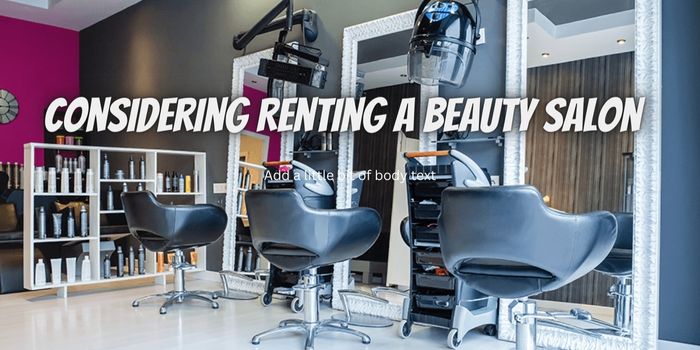If you’re an aspiring salon owner or an experienced beauty professional looking to expand your business, renting a beauty salon can be an excellent option. Renting a salon space allows you to establish your presence in the industry without the hefty upfront costs associated with purchasing a property. However, before making a decision, it’s essential to consider various factors that can help you determine if renting a beauty salon is the right choice for you. In this article, we will discuss key factors and considerations to help you make an informed decision.
Location
One of the most critical factors to consider when renting a beauty salon is the location. The location of your salon plays a vital role in attracting clients and ensuring convenient access for both customers and employees. Consider the following subtopics when evaluating the location of a potential salon for rent:
- Target Market – Research and identify your target market to ensure that the location aligns with their preferences and demographics. For example, if your target market consists of young professionals, a salon located near corporate offices or residential areas may be ideal.
- Visibility – Look for a salon space that offers high visibility and exposure. A location with heavy foot traffic or near popular shopping centers can help increase your salon’s visibility and attract potential clients.
- Competition – Assess the competition in the area. While some competition can indicate a healthy market, an oversaturated market may make it challenging to establish your salon’s presence. Find a balance that allows for healthy competition while still offering potential growth opportunities.
Space and Layout
The physical space and layout of the salon are crucial considerations when renting a beauty salon. Take the following factors into account:
- Size – Determine the size of the salon space you require based on the services you plan to offer and the number of employees you will have. Ensure that the space is adequate for your equipment, stations, waiting area, and storage needs.
- Layout – Evaluate the layout of the salon space. Consider if it provides a comfortable and functional flow for both clients and staff. Ideally, it should have designated areas for reception, hair, nails, skincare, and other services you offer.
- Amenities – Check for amenities such as water supply, ventilation, electricity capacity, and sufficient parking spaces. These amenities are essential for providing a pleasant experience for your clients and ensuring smooth operations.
Lease Terms and Costs
Understanding the lease terms and costs associated with renting a beauty salon is vital for financial planning. Consider the following aspects:
- Lease Duration – Determine the length of the lease and assess if it aligns with your long-term business goals. Short-term leases offer flexibility, while long-term leases provide stability.
- Rent and Additional Costs – Analyze the rent and any additional costs associated with the salon space. Additional costs may include utilities, maintenance fees, property taxes, or common area expenses. Ensure that these costs fit within your budget and consider negotiating the terms if necessary.
- Rent Increases – Inquire about rent increase clauses in the lease agreement. Understand the frequency and percentage of potential rent increases to evaluate their impact on your business’s financial stability.
Licensing and Permits
Renting a beauty salon requires complying with local regulations, licensing requirements, and permits. Familiarize yourself with the legal obligations and considerations:
- Salon Licenses – Determine the licenses required to operate a salon in your area, such as cosmetology licenses or esthetician permits. Ensure that you and your staff meet these requirements before proceeding.
- Building Permits – Inquire about any building permits or modifications required to meet specific zoning or safety regulations. Confirm if the landlord or tenant is responsible for obtaining these permits.
- Insurance – Explore the insurance coverage necessary to protect your business and determine the coverage required for your business operations. Consider general liability, property, and professional liability insurance, among others.
Landlord and Tenant Relationship
Building a positive and collaborative relationship with your landlord is essential when renting a beauty salon. Consider the following subtopics when evaluating the landlord-tenant relationship:
- Communication – Evaluate the landlord’s communication style and response time. Determine if they are willing to discuss concerns or issues that arise in the rental agreement.
- Maintenance and Repairs – Understand the landlord’s responsibilities for maintenance and repairs, and communicate any necessary repairs promptly. A proactive landlord can help maintain the salon’s appearance and keep it in good condition.
- Flexibility – Discuss any flexibility in the lease agreement with the landlord. They may be willing to negotiate lease terms or offer rent incentives to attract and retain tenants.
Renting a beauty salon can be an exciting opportunity for beauty professionals to establish their business in the industry. However, before making a decision, it’s essential to evaluate several factors that can impact your business’s success. By doing so, you can make an informed decision that aligns with your long-term business goals and ensures a smooth and successful operation.
